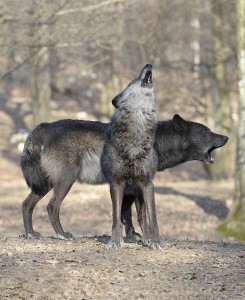Wolves have their own way of communicating: they howl. Scientists of the Messerli Research Institute at the University of Veterinary Medicine, Vienna (Vetmeduni Vienna) in collaboration with scientists of the Universities of Zürich and Parma have investigated what drives this form of vocalization. When individual wolves are separated from the pack, the intensity of howling of each remaining pack member is determined by the relationship between the separated wolf and the howler, while emotional stress is less important. The results are published today in the prestigious journal Current Biology.
The functions of animal vocalizations are being studied by behavioural scientists throughout the world. One of the main issues relates to whether animals control their vocalizations or whether the sounds are instead triggered by emotional stress. Researchers at the Vetmeduni Vienna have addressed this question by studying hand-reared wolves at the Wolf Science Center at the Wild Park Ernstbrunn in Austria.
Wolves howl more when an alpha animal disappears
If pack members leave the group, wolves call in an effort to re-assemble the pack. The scientists have found that if a high-ranking wolf or the partner of one leaves the pack, the remaining wolves howl with greater intensity. As Friederike Range, the corresponding author of the paper, explains, “We studied two wolf packs by taking individual wolves for a long walk on a leash and looking at the calling behaviour of the remaining pack members.” During the separation, the researchers recorded the howling of the remaining animals on video and audio tape.
Emotional stress is not pivotal for howling
To test the relationship between howling intensity and emotional stress, the researchers took saliva samples 20 minutes after each separation and measured the amount of stress hormones in each of the remaining animal. They found that the hormone levels did not correlate with the intensity of howling, so they concluded that howling is not only controlled by emotional stress. As Range says, “We suspect that wolves are able to control at least some of their howling in a flexible manner.”
Wolves only howl when a pack member goes far away
The researchers not only took wolves on long walks but also examined the effects of a different kind of separation by accommodating individual wolves in an adjacent building. The remaining pack members were able to observe where the missing member went, either staying close in the neighbouring building or going far away on a walk. The animals reacted accordingly. Separation of an animal only caused intense howling and release of stress hormones if the wolf went far away. Temporary accommodation in the adjacent building did not cause the same intense reaction. “This suggests that it is more stressful for wolves when they do not know where their pack member has gone,” says Range.

